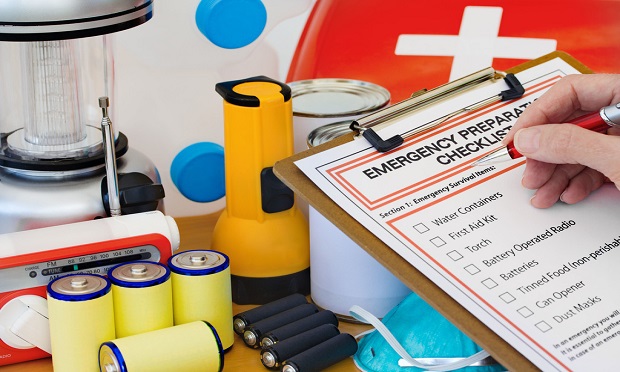 The four-step cycle for emergency management consists of preparedness, response, recovery and mitigation. (Shutterstock)
The four-step cycle for emergency management consists of preparedness, response, recovery and mitigation. (Shutterstock)As the country continues to respond to the ongoing COVID-19 threat, as well as the numerous natural disasters (including higher-than-normal hurricane and wildfire conditions), and property damage resulting from recent civil unrest, it is more important than ever for businesses, higher education institutions, and communities to be proactive in taking steps to protect people and property.
Consider this:
The Federal Emergency Management Agency says that “for mitigation to be effective, we need to take action now — before the next disaster — to reduce human and financial consequences later (analyzing risk, reducing risk, and insuring against risk).”
And a recent report from the National Institute of Building Sciences, a nonprofit, non-governmental organization established by Congress in 1974, suggested a number of mitigation actions that could help communities decrease damages from natural disasters, including adopting up-to-date building codes and exceeding codes to the upgrade of utility and transportation infrastructure. The NIBS report maintains that mitigation can not only reduce the impact of natural disasters, but also improve safety, prevent property loss, and minimize disruption.
The four-step cycle for emergency management, consisting of preparedness, response, recovery and mitigation — is a good start for businesses, organizations and agencies to assess their capabilities when it comes to any unexpected critical incident, crisis or disaster. Depending on who you talk to, mitigation either comes first in that series or last; but either way, it appropriately comes after recovery and before preparedness.
Effective incident response
Unfortunately, mitigation is often the forgotten step in the emergency management cycle, but it is no less important than any of the other three — as an effective mitigation strategy is an investment in creating a framework that aids efficient decision-making and actions that help ensure health, safety and security. Taking proactive steps toward mitigation is essential in protecting people, businesses, structures, and entire communities, and allows emergency managers to learn lessons from current or previous incidents, and apply them to more effectively prepare and respond to future emergencies in order to accelerate recovery.
To create a robust mitigation strategy as well as an overall emergency action plan, organizations should constantly identify and assess risks, and adjust their plan to prepare for any incident, emergency, or disaster that might occur. Some of these processes should include but are not limited to:
- Conducting risk assessments to identify potential emergency threats.
- Identifying key personnel involved in emergency response and their roles, as well as stakeholders and agencies involved in emergency response.
- Creating specific procedures and protocols for response and recovery.
- Establishing an incident command center for coordination of response and communications.
- Developing procedures for critical incident response coordination across multiple locations.
- Establishing processes for evacuation, shelter, sheltering-in-place, or facilities lockdown.
- Compiling all forms to be used during different responses, including incident reports and forms for insurance purposes.
- Seeking input on the plan from all stakeholders including law enforcement, fire, medical/hospital, public health, emergency management.
- Assessing processes for reviewing, maintaining, and completing reports, insurance filings, maintenance information, etc.
A comprehensive critical incident management plan that is informed by these mitigation strategies, used in conjunction with an effective emergency management technology platform, are all essential pieces to overall preparedness and response for natural or human-caused disasters.
Technology tools can help
By using a centralized emergency management platform that provides the situational awareness needed to assess risks, minimize impact, and manage response can enhance mitigation, preparedness, response, and recovery capabilities. Utilizing this type of technology gives organizations real-time views — or a common operating picture — of incidents and situations that helps to safeguard people, protect property, and maintain business continuity. An added benefit is that a critical incident management platform can also be used on a day-to-day basis to record all types of various events, incidents, and activities.
In today’s COVID-19 environment, we know all too well that not all disasters can be averted.
A disaster or other critical event can inflict massive costs to businesses, organizations, and communities, not only threatening lives, but also affecting property, facilities, supply chains, business continuity, and other assets.
Considering the enormous costs a critical incident can inflict, it is wise to thoroughly assess current emergency action plans as well as consider an emergency management platform that can help with all aspects of the emergency management cycle. Emergency management is an unending cycle that requires organizations to constantly reassess and revise preparedness plans, update response procedures, train personnel, perform tests and exercises, and stay aware and up to date on potential risks or threats.
Robert Watson ([email protected]) is CEO of Juvare, an information technology company based in Atlanta, Ga. that provides a variety of businesses and organizations with emergency preparedness response tools. These opinions are the author’s own.
Also by this contributor: Emergency response management during COVID-19
"emergency" - Google News
September 23, 2020 at 08:00PM
https://ift.tt/3csnsRa
Mitigation: An essential step in any emergency response plan - PropertyCasualty360
"emergency" - Google News
https://ift.tt/2VVGGYQ
https://ift.tt/3d7MC6X
emergency
Bagikan Berita Ini














0 Response to "Mitigation: An essential step in any emergency response plan - PropertyCasualty360"
Post a Comment